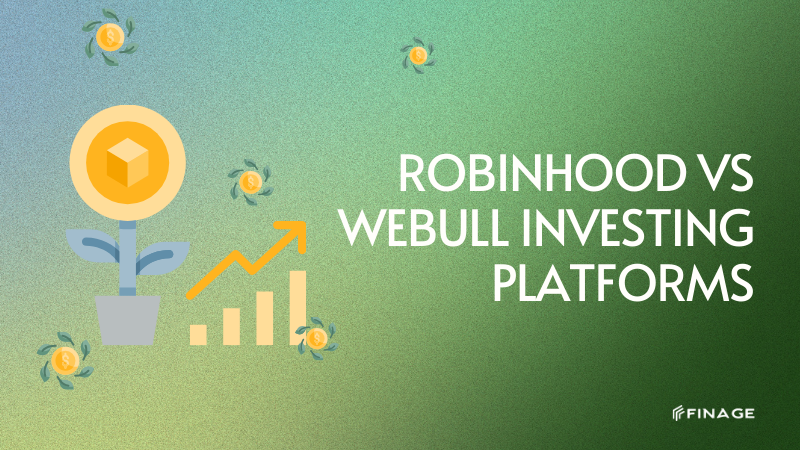
Robinhood vs. Webull Investing Platforms
With the current tech innovations, and basically, in the modern age in which we live is such that anything can be done on a device from anywhere. That includes trading. The up-to-date online platforms in existence are numerous, as are the choices, but two in particular stand out for their free stock trading among other things and they are Robinhood and Webull. While these are worthy choices, there's enough of a difference between the two to warrant questions of which is better.
To best answer this question of which stands above the other, a comparison between them is an order. Fortunately, let’s check the information below, giving both similarities and differences and finally, see which of the two is the better choice.
Contents:
- What they have in common
- What separates them
- Differences in order types and technological capabilities
- Other areas of interest
- Final thoughts
What they have in common
The chief similarity between both platforms on the most basic level is that they're user-friendly, with use on both desktop and mobile devices being somewhat easy. In addition to this, they both deal in ETFs, options, crypto, and stocks, with the fees users are expected to pay when trading these being non-existent. Other asset classes such as bonds, and mutual funds, however, will not be found in either.
Both are viewed as being quite secure and have the same login measures such as two-factor authentication. Both also provide SIPC insurance, although it's much larger on Webull, which makes it perfect for bigger investors.
What separates them
The above generalities are where the similarities between the two platforms end, as their scale, and their range of potential users greatly differ. The older Robinhood upon closer look is built specifically for beginners, while Webull caters not only to those starting, but advanced traders, and everyone in between.
The first obvious spot to look at is the mobile, and desktop experience, which while user-friendly on both, aren't customizable on Robinhood. Webull is customizable, while also having way more features on both digital spaces which include the following:
- Dozens of technical indicators
- Advanced charting
- Financial reporting
- Greater market news
- Tools for both fundamental and technical analysis
How research is conducted on both is pretty basic, especially when compared to the larger, more established platforms out there. For additional charges, both will give you more information, although Webull's chart customization abilities give it the edge over its rival. This is also true for its portfolio research capabilities, which are also better and include several features not found on Robinhood such as internal rate of return, as well as income from dividends, and interest.
Differences in order types and technological capabilities
This ranging nature also finds itself in the type of orders found on the platforms, with the standard stop limit, and trailing stop orders being present on either. However, the more conditional orders used by traders above the basic threshold aren't present on Robinhood, but they are on Webull. Said order types include:
- One-cancel-the-other (OCO)
- One-triggers-the-other (OTO)
- One-triggers-an-OCO (OTOCO)
As for the technology backing both platforms, suffice it to say that it's nowhere near the level of giants such as Interactive brokers. As such, traders shouldn't expect to find trading automation, smart order routing, or backtesting on either space. That said, traders using these typically aren't looking for the pricier tech features and will find that what both platforms possess is adequate.
Other areas of interest
If the above comparisons don't suffice, you could always look at what accounts they have, as well as their overall customer service. As for the available accounts, both spaces do provide both taxable brokerage, and individual retirement accounts of multiple types, although Webull edges out its rival in terms of sheer variety.
Their approaches to educating people on trading, while different in some ways, will work, although the provision of videos, podcasts, and newsletters on Robinhood makes it the better choice in this regard. However, educational content isn't as good on either platform as it is on larger ones.
Finally, we can look at customer service, which on both platforms, is severely lacking. That said, if we were to compare both, the lack of chatbot, and direct call-for-aid services on Robinhood put it behind Webull, which has the phone access during active hours, although long wait times are by no means ideal.
Final thoughts
Now that we've looked at how these two platforms stack up against each other, we can have an idea of which one is better. As far as a head-to-head is concerned, it's pretty clear that Webull is the better choice, as its greater number of features, user-friendliness, and ability to cater to all levels of trading knowledge shows. With Robinhood, the likelihood of people just growing out of it is high, although the nearly 16 million monthly users show that it may not be a pressing issue.
In any case, both platforms are necessary to give people easier access to the trading world. None of them has the capabilities of larger platforms, but they will suffice. If you need real-time or historical data for improving trading decisions, you can get extra information about Finage solutions and tools!
You can get your Real-Time and Historical Market Data with a free API key.
Build with us today!


